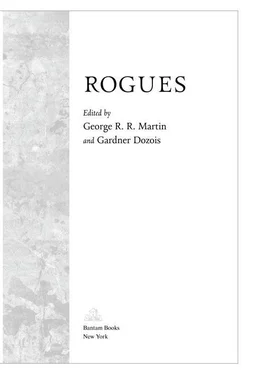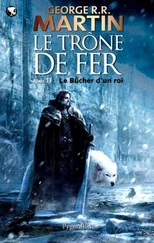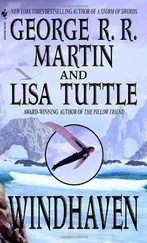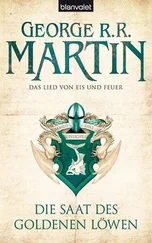Like Warriors and Dangerous Women, our previous crossgenre anthologies, Rogues is meant to cut across all genre lines. Our theme is universal, and Gardner and I both love good stories of all sorts, no matter what time, place, or genre they are set in, so we went out and invited well-known authors from the worlds of mystery, epic fantasy, sword and sorcery, urban fantasy, science fiction, romance, mainstream, mystery (cozy or hard-boiled), thriller, historical, romance, Western, noir, horror … you name it. Not all of them accepted, but many did, and the results are on the pages that follow. Our contributors make up an all-star lineup of award-winning and bestselling writers, representing a dozen different publishers and as many genres. We asked each of them for the same thing—a story about a rogue, full of deft twists, cunning plans, and reversals. No genre limits were imposed upon on any of our writers. Some chose to write in the genre they’re best known for. Some decided to try something different.
In my introduction to Warriors, the first of our crossgenre anthologies, I talked about growing up in Bayonne, New Jersey, in the 1950s, a city without a single bookstore. I bought all my reading material at newsstands and the corner “candy shops,” from wire spinner racks. The paperbacks on those spinner racks were not segregated by genre. Everything was jammed in together, a copy of this, two copies of that. You might find The Brothers Karamazov sandwiched between a nurse novel and the latest Mike Hammer yarn from Mickey Spillane. Dorothy Parker and Dorothy Sayers shared rack space with Ralph Ellison and J. D. Salinger. Max Brand rubbed up against Barbara Cartland. A. E. van Vogt, P. G. Wodehouse, and H. P. Lovecraft were crammed in with F. Scott Fitzgerald. Mysteries, Westerns, gothics, ghost stories, classics of English literature, the latest contemporary “literary” novels, and, of course, SF and fantasy and horror—you could find it all on that spinner rack, and ten thousand others like it.
I liked it that way. I still do. But in the decades since (too many decades, I fear), publishing has changed, chain bookstores have multiplied, the genre barriers have hardened. I think that’s a pity. Books should broaden us, take us to places we have never been and show us things we’ve never seen, expand our horizons and our way of looking at the world. Limiting your reading to a single genre defeats that. It limits us, makes us smaller. It seemed to me, then as now, that there were good stories and bad stories, and that was the only distinction that truly mattered.
We think we have some good ones here. You will find rogues of every size, shape, and color in these pages, with a broad variety of settings, representing a healthy mix of different genres and subgenres. But you won’t know which genres and subgenres until you’ve read them, for Gardner and I, in the tradition of that old wire spinner rack, have mixed them all up. Some of the tales herein were written by your favorite writers, we expect; others are by writers you may never have heard of (yet). It’s our hope that by the time you finish Rogues, a few of the latter may have become the former.
Enjoy the read … but do be careful. Some of the gentlemen and lovely ladies in these pages are not entirely to be trusted.
Joe Abercrombie is one of the fastest-rising stars in fantasy today, acclaimed by readers and critics alike for his tough, spare, no-nonsense approach to the genre. He’s probably best known for his First Law trilogy, the first novel of which, The Blade Itself, was published in 2006; it was followed in subsequent years by Before They Are Hanged and Last Argument of Kings. He’s also written the stand-alone fantasy novels Best Served Cold and The Heroes. His most recent novel is Red Country. In addition to writing, Abercrombie is also a freelance film editor, and lives and works in London.
In the fast-paced thriller that follows, he takes us deep into the dirty, rank, melodious, and mazelike streets of Sipani, one of the world’s most dangerous cities, for a deadly game of Button, Button, Who’s Got the Button?
TOUGH TIMES ALL OVER
Joe Abercrombie
Damn, but she hated Sipani.
The bloody blinding fogs and the bloody slapping water and the bloody universal sickening stink of rot. The bloody parties and masques and revels. Fun, everyone having bloody fun, or at least pretending to. The bloody people were worst of all. Rogues every man, woman, and child. Liars and fools, the lot of them.
Carcolf hated Sipani. Yet here she was again. Who, then, she was forced to wonder, was the fool?
Braying laughter echoed from the mist ahead and she slipped into the shadows of a doorway, one hand tickling the grip of her sword. A good courier trusts no one, and Carcolf was the very best, but in Sipani, she trusted … less than no one.
Another gang of pleasure-seekers blundered from the murk, a man with a mask like a moon pointing at a woman who was so drunk she kept falling over on her high shoes. All of them laughing, one of them flapping his lace cuffs as though there never was a thing so funny as drinking so much you couldn’t stand up. Carcolf rolled her eyes skyward and consoled herself with the thought that behind the masks they were hating it as much as she always did when she tried to have fun.
In the solitude of her doorway, Carcolf winced. Damn, but she needed a holiday. She was becoming a sour ass. Or, indeed, had become one and was getting worse. One of those people who held the entire world in contempt. Was she turning into her bloody father?
“Anything but that,” she muttered.
The moment the revelers tottered off into the night, she ducked from her doorway and pressed on, neither too fast nor too slow, soft bootheels silent on the dewy cobbles, her unexceptional hood drawn down to an inconspicuous degree, the very image of a person with just the average amount to hide. Which, in Sipani, was quite a bit.
Over to the west somewhere, her armored carriage would be speeding down the wide lanes, wheels striking sparks as they clattered over the bridges, stunned bystanders leaping aside, driver’s whip lashing at the foaming flanks of the horses, the dozen hired guards thundering after, streetlamps gleaming upon their dewy armor. Unless the Quarryman’s people had already made their move, of course: the flutter of arrows, the scream of beasts and men, the crash of the wagon leaving the road, the clash of steel, and finally the great padlock blown from the strongbox with blasting powder, the choking smoke wafted aside by eager hands, and the lid flung back to reveal … nothing.
Carcolf allowed herself the smallest smile and patted the lump against her ribs. The item, stitched up safe in the lining of her coat.
She gathered herself, took a couple of steps, and sprang from the canal side, clearing three strides of oily water to the deck of a decaying barge, timbers creaking under her as she rolled and came smoothly up. To go around by the Fintine bridge was quite the detour, not to mention a well-traveled and well-watched way, but this boat was always tied here in the shadows, offering a shortcut. She had made sure of it. Carcolf left as little to chance as possible. In her experience, chance could be a real bastard.
A wizened face peered out from the gloom of the cabin, steam issuing from a battered kettle. “Who the hell are you?”
“Nobody.” Carcolf gave a cheery salute. “Just passing through!” and she hopped from the rocking wood to the stones on the far side of the canal and was away into the mold-smelling mist. Just passing through. Straight to the docks to catch the tide and off on her merry way. Or her sour-assed one, at least. Wherever Carcolf went, she was nobody. Everywhere, always passing through.
Читать дальше












